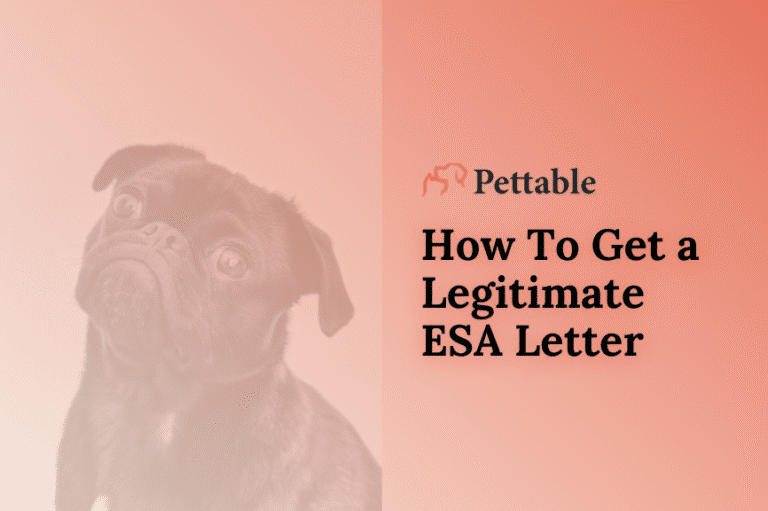How to Get an Emotional Support Animal (ESA) Letter in Michigan

If you are looking for an emotional support animal and live in Michigan, there are many rules, regulations, and federal laws that you must remember. An assistance animal can do the same thing a support animal does, while a service dog is specifically trained, falling under the category of psychiatric service animals.
While helpful documentation for your emotional support animal is an ESA letter, Michigan has different rules depending on where you can take your emotional support animal in public.
You can give an ESA letter to your landlord or housing provider to ensure that your support animal in Michigan can live with you. Under the Fair Housing Act, emotional support animals are protected, and landlords cannot demand a pet fee, even if they have a no-pet policy.
Read on to find out what an emotional support animal is, how you can receive an ESA letter, and what protections your emotional support animal has in private and public.
What is an Emotional Support Animal Letter?
An ESA letter is an official document that shows a person’s need for an emotional support animal to help them with their disability. A licensed mental health professional in your state must write and sign these letters. They can secure emotional support animal access to rental housing regardless of pet policies or restrictions.
What is an Emotional Support Animal?
An emotional support animal is an animal that provides emotional support and therapeutic benefits for a person dealing with a mental health condition or an emotional disability. While emotional support animals are not considered service animals, they are also not pets under U.S. federal laws. Because of this distinction, emotional support animals can be any species or breed, as long as it is domesticated.
How to Get an ESA Letter in Michigan
An ESA letter is the official document that acts as proof that the individual has mental health disabilities or emotional disabilities that require the benefit of an emotional support animal.
To receive an ESA letter in Michigan, individuals with disabilities must first speak with their healthcare provider, who can set them on track with a licensed mental health professional. In speaking with a licensed mental health professional (LMHP), individuals will be on the right path to receiving an emotional support animal and an ESA letter.
After the mental health professionals determine an individual qualifies for an ESA letter for their mental health disability, they will write and sign a letter that will work for landlords and may even work for public accommodation.
We’ve researched extensively to find the best licensed mental health professionals in Michigan who you should connect with to get started and receive your ESA letter.
Complete our Assessment
First, you’ll complete a 3-minute quiz to help us match you with the right therapist for your needs. Then you will select the type of ESA letter you will need, whether it is one for housing or travel or a hybrid that can do both.
Consult with a Therapist
After filling out the quiz and receiving authorization from our clinicians to work with you, you’ll be matched with an LMHP from your state and have an over-the-phone or video call consultation with them. You’ll complete a mental health evaluation to determine if you qualify for an emotional support animal.
Get Your ESA Letter
Once our LMHP determines whether an emotional support animal is essential to your care and wellbeing or not, they’ll proceed accordingly. If they decide that an emotional support animal is necessary for your wellbeing, they’ll write a legally-recognized ESA letter for you. You’ll then have the option of receiving an ESA letter within 24 hours from the time of your consultation, excluding California residents.
Emotional Support Animal Laws in Michigan
Support animal laws in Michigan largely mirror the rules at the national level. The state is very pet-friendly and has many laws that prevent animal cruelty.
Additionally, a handler in Michigan could receive significant fines for offering fake emotional support animals. If a trainer makes requests, such as they require documentation specifically of your disability, or they offer to register your companion animal, they are not legit.
Below, we’ll cover specifics of Michigan’s laws regarding the different areas of public access, travel, work environment, and housing. This information lays out the benefits available to you as an emotional support animal owner in Michigan.
Michigan ESA Housing Laws
Per the federal Fair Housing Act (FHA), the state of Michigan requires that all housing providers make reasonable accommodations for tenants with a valid ESA letter for their support animal.
Under the federal Fair Housing Act, landlords cannot apply extra fees to the tenants for keeping support animals in their homes or add any restrictions to their emotional support animals in Michigan.
This is true regardless of the landlord’s policies, such as no-pet housing, or their restrictions on pets, as ESAs are not recognized as pets. At most, the landlord can request an up-to-date ESA letter within reason, but they cannot deny you and your ESA proper accommodations should you have an ESA letter.
According to housing laws, housing providers cannot deny you access to housing because of your mental or emotional disabilities. The Americans with Disabilities Act (ADA) protects you and your support animal in Michigan from specific fees and restrictions.
Michigan ESA Laws for Employment
While employment laws do not legally require you to accommodate an assistance animal, they cannot discriminate against you for having a disability or an ESA due to the Americans with Disabilities Act (ADA).
Ultimately it’s up to the businesses if they are willing to accommodate their employee’s ESA. In any case, it’s best to bring your ESA letter to work and explain your need for an ESA to your employer or the HR department to see if they will let you get your cuddly friend into your workspace.
The Americans with Disabilities Act protects you from having to answer questions regarding your therapy animals or service animal and how they assist you in everyday activities. You do not have to disclose your disability or how they help you in your everyday life.
Michigan ESA Laws for Travel
The Air Carrier Access Act (ACAA) is a federal law that used to allow anyone who was issued a valid ESA letter the ability to travel with their ESA. However, in addition to the letter, anyone with an ESA would also explain to the carrier how and why their ESA supplies them with emotional support.
However, this has recently changed. This isn’t the case anymore because the ACCA no longer classifies an ESA in the same category as they would a service animal. If your ESA is small enough in Michigan, some airlines will allow you to bring them with you as a carry-on. However, to do this, you must pay a fee and fill out paperwork. Then, you must agree with the airline that your ESA will remain well-behaved. Otherwise, they reserve the right to ask you to leave or place your ESA in a holding area.
Michigan ESA Public Access Laws
While ESAs are often allowed in the same public spaces as service animals, you can be asked to leave the public space at any time. Because, under the ADA and Michigan law, owners of public accommodations and public spaces are under no obligation to allow you to bring your ESA into that space. That obligation only applies to service animals. Your ESA can only accompany you to public locations where pets can accompany you.
That doesn’t change even if you outfit your ESA with a vest or if you have a unique ID card for them. And just like pets, any ESA damages that an ESA places on private property are liable to be retracted from the owner’s finances. You are responsible for how your ESA acts and the type of actions they commit.
How Do You Qualify for an ESA?
If you have an emotional disability, you can legally qualify for an ESA by getting certified as emotionally disabled by a psychologist, therapist, psychiatrist, or other licensed and/or certified mental health professional. This certification, known as an ESA Letter, should be formal and appropriately formatted.
Emotional Support Animals vs. Service Animals
One of the core differences is that not all ESAs are dogs. There is a multitude of different domesticated animals which can be classified as ESA’s, such as cats, rabbits, birds, minipigs, mice, ferrets, hedgehogs, rats, etc. And these animals don’t need to be trained beyond basic instructions on how to listen to you.
Meanwhile, most service animals are dogs that have been trained to mitigate a specific disability. Because of the wide variety of service dogs and specific actions each type of service dog must complete, service dogs are trained individually to ensure they can achieve their job.
A service animal is typically a dog or a miniature horse; however, ESAs can be any breed.
Emotional Support Dogs vs. Psychiatric Service Dogs
Emotional support dogs assist through their presence alone. Meanwhile, psychiatric service dogs (PSDs) are specially trained to perform tasks for someone with a disability.
Emotional support dogs also don’t require the same level of training that a psychiatric service animal does to assist their user.
A psychiatric service animal is commonly a dog breed, while a support animal in Michigan can be any breed.
Frequently Asked Questions About ESAs and Letters
The following are frequently asked questions (FAQs) about emotional support animals regardless of the state. These questions are answered below in a manner that should prove prudent for anyone seeking an ESA, irrespective of location.
Can a landlord deny an emotional support animal?
The only way the landlord can deny your ESA letter is if the animals cause significant property or housing unit damage and pose a direct threat to the safety of other tenants. Otherwise, they must accommodate your ESA and allow it to live within your space.
Are ESA animals (s) safe?
All that matters is that the ESA isn’t a danger to itself or others in public and doesn’t act as a significant distraction for others in the crowd. However, ESAs are only allowed in non-pet housing and airplanes to be transported alongside the owner. You could get kicked out of a public location for bringing an ESA.
Is ESA a Trained service animal(s)?
ESA’ are not frequently trained and do not need to perform specific tasks to help you. The benefit of an ESA is that its presence is what will relieve any symptoms of mental health conditions that you may be experiencing. To legally have an ESA, an LMHP must recognize the owner as having “a qualifying mental health or psychiatric disability by an LMHP, which is documented by a properly formatted prescription letter.”
What is a Service Animal
A service animal is typically a dog or a miniature horse trained to perform tasks specific to helping an individual with a disability. For instance, guide dogs are service animals for those who are blind, and hearing dogs are service animals for those who are deaf. They are trained to help their owners operate in their everyday lives. And, because of their functionality, service animals are allowed to enter many public places within the U.S through the Americans with Disabilities Act.
Does ESA follow the same laws as service dogs?
They also follow very different laws and restrictions, as do their handlers. ESAs are allowed to live in specific locations that pets wouldn’t be allowed to live in due to their therapeutic benefits. Meanwhile, psychiatric service dogs are given fewer restrictions in the type of public locations they can enter.
How Much Does an ESA Letter from Pettable Cost?
An ESA letter from Pettable costs $149, but we offer individual letters for housing and travel purposes. You can get a discount if you purchase both, as our accommodation and travel package costs $199. We offer a risk-free guarantee that we will refund your entire payment if your ESA Letter doesn’t work correctly.






